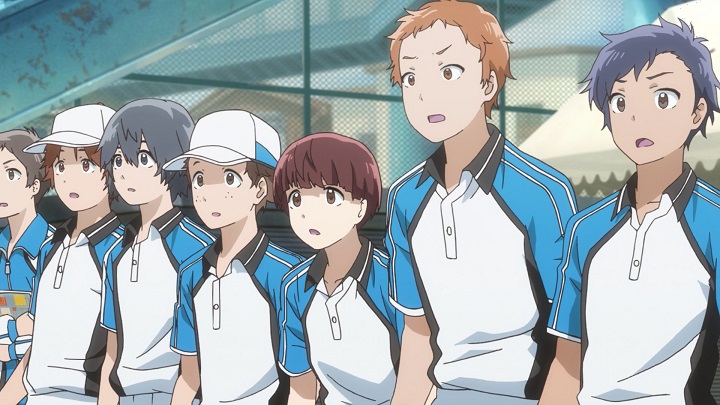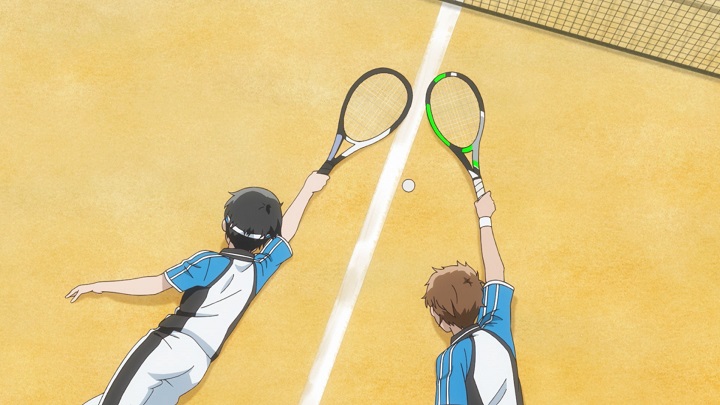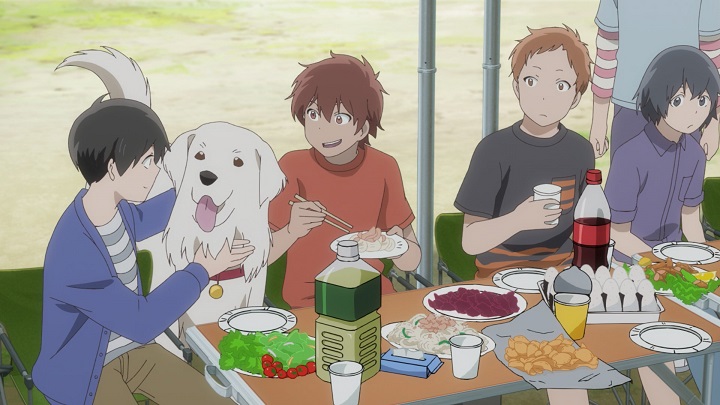This episode was a tale of two halves in my view, but there’s no good tennis metaphor that I can use as a comparison, so a direct explanation will have to do. Essentially, I found the first half (the conclusion of Maki and Toma’s doubles match) to be a dull affair, while the team barbecue during the B part reignited my interest in the series. Hoshiai no Sora established itself as a character drama from its very first outing, and with so many unresolved anxieties still to address within Shijo’s tennis club, the recent emphasis on sports has generated mixed results. No such issues arise, however, when the show sits a bunch of people around a table to converse about their lives (the food is just a pretext).
The most interesting thing about the A part was its periodic use of a 3D environment to bring dynamism to the doubles match. I can’t say I cared for the final result, as the typical problems of compositing 2D characters onto CG backgrounds were still evident here – the biggest one being that they seemed to move at different speeds. There was a moment that I thought was pretty successful, though, when the camera followed one of Oji’s serves in a straight shot across the court. Since Maki was illustrated in a mostly still position to receive the serve, the result felt natural. Unfortunately, the rest of the match did nothing to set itself apart from a dozen series before it. Maki and Toma’s teammates on the sidelines repeatedly declared their performance “awesome.” They used the ancient strategy of targeting the middle of the court to confuse their opponents. Oji dominated his partner’s will to a comical degree, until they learned the Power of Teamwork to get themselves out of a jam during the final game. The match was concluded with a slow-motion dash to return a net ball. You know, sports stuff.
Despite their straight losses to Misaki’s superior team, the boys remained in good spirits afterwards. Not only were morale and motivation high, but Itsuki (who got the spotlight in episode 3) changed in the locker room for the first time, exposing the burns on his back to his teammates for the first time. Maki repaid that intimacy by striking up a normal conversation while everyone else had fallen silent, and the positive vibes carried on from there. Maki’s sensitivity to the emotional needs of others has surfaced before, but this was the biggest instance thus far, as Itsuki’s burns are a source of great shame for him. On top of demonstrating his kindness and consideration, I think this moment foreshadows Maki’s confession of his family situation to the team at large, rather than just Toma. Director Akane has built him up to be the unifier of a team that now trusts him implicitly, so repaying them with trust of his own seems like a logical next step.
As a matter of fact, he’s already gotten started by relaying the “little chocolates” story at the team’s riverside barbecue. Talking so openly about the ratty apartment where he and his mom once lived is a brave thing to do, though Maki has been such a straightforward character lately that I doubt he’d consider it as such. (As a matter of fact, where did the conniving “pay to play” schemer from the premiere wander off to?) He’s not the only character we learned about at this outing, as Kanako’s food-related issues and Oji’s pampered upbringing got mentions, as well. Kanako’s continued presence in every episode is something of a mystery, given that her role is essentially “pessimistic groupie,” but perhaps this new bit of info about her character will get a follow-up down the line. It’s Toma’s private concern that he’s “twisted” that’s most interesting, though – he can’t bring himself to join the conversation due to his discomfort in social situations. The previous air of negativity in the tennis club may have been a more breathable environment for him, given his mother’s critical personality. We haven’t checked in with Toma’s mom lately, though she was likely the parent who made the episode-ending complaint about the team’s practice schedule. If they butt heads over the issue, we may finally get a peek into his early childhood, so that’s something to look forward to (despite how painful it might be).




